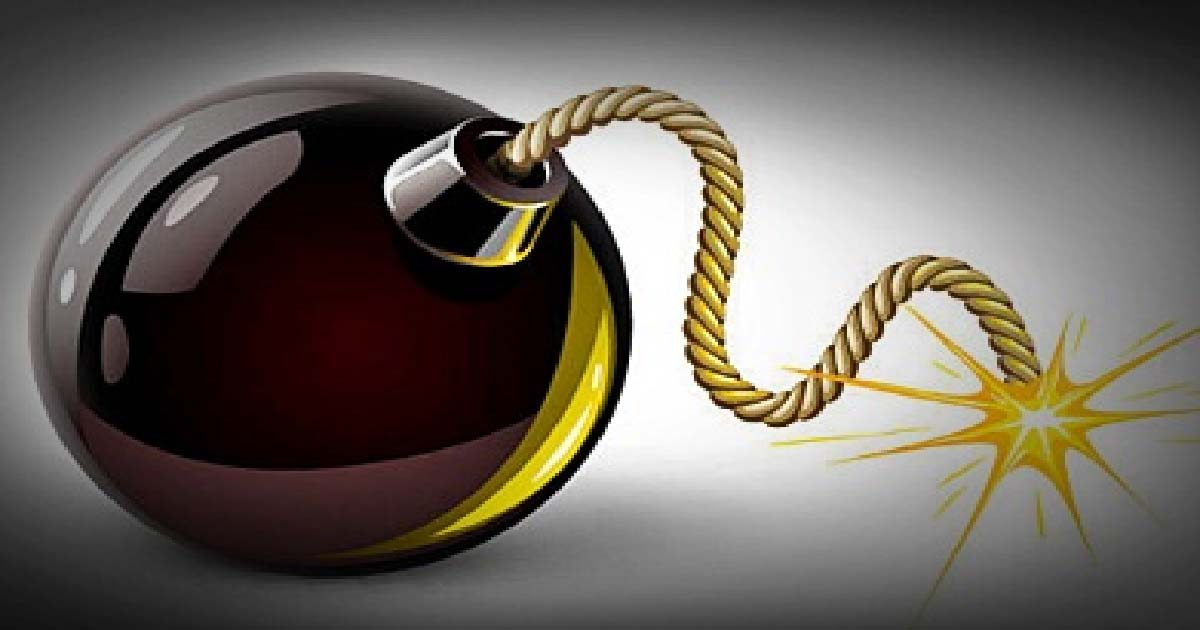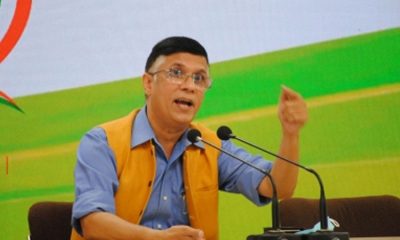National News
Delimitation Commission submits report: Recommends 43 Assembly seats for Jammu, 47 for Kashmir

The Delimitation Commission for Jammu and Kashmir on Thursday finalised the delimitation order and submitted it to the Election Commission of India wherein it has recommended 43 Assembly seats for Jammu division and 47 seats to the Kashmir region.
For the first time, nine Assembly Constituencies (ACs) have been reserved for the Scheduled Tribes, out of which, six are in Jammu region and three in Kashmir. The constitution of the erstwhile Jammu and Kashmir state had no provision for the reservation of seats for Scheduled Tribes in the Legislative Assembly.
As per the final Delimitation Order, out of the 90 Assembly Constituencies in the region, 43 will be part of Jammu region and 47 for Kashmir region keeping in view the provisions of Section 9(1)(a) of the Delimitation Act, 2002 and Section 60(2)(b) of Jammu & Kashmir Reorganisation Act, 2019, the Delimitation order said.
The six new Assembly constituencies in the Jammu region are expected to be carved out from Rajouri, Doda, Udhampur, Kishtwar, Kathua, and Samba districts.
The one new seat for the Kashmir Valley would reportedly be carved out from the Kupwara district.
As of now there are 46 seats in Kashmir region and 37 seats are in Jammu division.
“There are five Parliamentary Constituencies in the region. The Delimitation Commission has seen the Jammu & Kashmir region as one single union territory. Therefore, one of the Parliamentary Constituencies has been carved out combining the Anantnag region in the Valley and Rajouri and Poonch of Jammu region. By this reorganisation each Parliamentary Constituency will have an equal number of 18 Assembly Constituencies each,” the order further said.
The Commission headed by Justice Ranjana Prakash Desai, (a retired Judge of the Supreme Court of India), and Chief Election Commissioner Sushil Chandra, and Election Commissioner of Union Territory of Jammu and Kashmir K.K. Sharma as Ex-Officio members of the Delimitation Commission met Thursday to finalise the Delimitation Order for the Union Territory of Jammu & Kashmir.
The Commission also said that with regard to the relevant provisions of the Constitution (Article 330 and Article 332) and sub-sections (6) and (7) of Section 14 of the Jammu and Kashmir Reorganisation Act 2019, the number of seats to be reserved for the Scheduled Castes (SCs) and Scheduled Tribes (STs) in the Legislative Assembly of the Union Territory of Jammu and Kashmir was worked out on the basis of 2011 Census. Accordingly, the Delimitation Commission has reserved nine ACs for STs for the first time and seven for SCs.
The Commission has changed the names of a few Assembly Constituencies after hearing from the people and representatives of the political parties. These name changes included naming Tangmarg-AC as Gulmarg-AC, Zoonimar-AC as Zaidibal-AC, Sonwar-AC as Lal Chowk-AC, Padder-AC as Padder-Nagseni-AC, Kathua North-AC as Jasrota-AC, Kathua South-AC as Kathua-AC, Khour-AC as Chhamb-AC, Mahore-AC as Gulabhgarh-AC, Darhal-AC as Budhal-AC, etc.
In addition to these, there were many representations pertaining to shifting of Tehsils from one AC to another and some of them which Commission found logical were accepted, such as shifting of Tehsil Srigufwara from Pahalgam-AC to Bijbehara-AC, shifting of Kwarhama and Kunzar Tehsils to Gulmarg-AC and redrawing Wagoora-Kreeri-AC having Kareeri and Khoie tehsils and part of Wagoora and Tangmarg tehsils, shifting of Darhal Tehsil from Budhal-AC to Thannamandi-AC. Additionally, there were some requests for minor changes in the territorial jurisdiction of proposed ACs, which were thoroughly analysed in the Commission and a few of them, which were logical, have been incorporated in the final Order.
The Delimitation Commission was constituted by the Centre on March 6, 2020 in exercise of powers conferred by Section 3 of the Delimitation Act, 2002 (33 of 2002), for the purpose of delimitation of Assembly and Parliamentary Constituencies in the Union Territory of Jammu & Kashmir.
The Commission associated in its work, five members of the Lok Sabha elected from the UT of Jammu and Kashmir. These Associate Members were nominated by the Lok Sabha Speaker.
The Delimitation Commission was entrusted with the work of delimiting the Assembly and Parliamentary Constituencies in the UT of Jammu and Kashmir on the basis of 2011 Census and in accordance with the provisions of Part-V of the Jammu and Kashmir Reorganisation Act, 2019 (34 of 2019) and the provisions of Delimitation Act, 2002(33 of 2002).
Crime
Three Noida schools receive hoax bomb threat emails; UP Police launch probe

Noida, Dec 19: Panic gripped Noida in Uttar Pradesh’s Gautam Buddha Nagar district, as several prominent educational institutions received threatening emails warning of bomb blasts in their premises.
The e-mail bomb threat, received by the Step by Step School in Sector-126, triggered an alarm in the school administration, leading to the evacuation of children and teachers, followed by heightened security checks.
The police teams rushed to the campus after they were informed about a bomb threat by the school administration. Police reached the spot, cordoned off the school premises and carried out a thorough search operation; however, nothing suspicious was found. Bomb disposal squad and dog squad were brought in to scan the classrooms, corridors, basement, playgrounds and other sensitive areas.
As no mysterious objects or explosive materials were recovered during the search, the police eventually declared it to be a hoax call.
The latest episode of bomb threats in Noida and other NCR schools marks a continuation of the disturbing trend of hoax threats, seen in the past few months, targeting educational institutions – primarily schools.
Apart from the Step by Step School, the two other schools that are reported to have received hoax threat calls include Amity School and Shiv Nadar School. The simultaneous threats via email to the city’s three prestigious schools created an atmosphere of fear and trepidation among the administration as well as parents.
Meanwhile, the police have launched a detailed probe into the incident, activating its cyber cell to identify the source and sender of the hoax email. An investigation is underway to locate the IP address from which the threatening email was sent, and also to determine whether it was an act of mischief or an organised conspiracy.
The Noida Police have also appealed to the school authorities and the public at large, not to take any suspicious information lightly, but also not to pay attention to rumours and hearsay. Parents as well as the general public have been urged to immediately report any visible threat or suspicious activity to the police.
Business
Nifty to touch 29,094 in 12 months supported by durable earnings, strong macro backdrop

New Delhi, Dec 19: India’s benchmark index Nifty is expected to touch 29,094 in one year based on long‑term valuation averages and earnings durability, a report said on Friday.
Wealth management firm PL Wealth said in the report that India enters the end of 2025 from a position of relative macro strength with record‑low inflation, a dovish monetary stance, resilient domestic demand and improved corporate earnings visibility.
“In the near term, large-cap stocks remain preferred due to their earnings stability and strong balance sheets, while selective exposure to high-quality mid-cap names is being added as visibility improves,” the wealth management firm cited its strategy.
Over the next 6 to 24 months, the earnings cycle is expected to broaden across consumption, financials, capex-linked sectors and select industrials, supported by benign inflation, lower interest rates and sustained domestic liquidity.
“India’s current macro configuration is among the most constructive we have seen in over a decade,” said Inderbir Singh Jolly, CEO, PL Wealth Management.
While global uncertainties will continue to create short-term volatility, India’s structural strengths—policy reform, financialisaton of savings and improving corporate balance sheets—position it well for sustained long-term growth, Inderbir added.
RBI’s 25 basis‑point cut to a 5.25 per cent policy repo rate lowered its CPI inflation projections and upgraded GDP growth estimates, signalling confidence in the sustainability of domestic demand, the report said.
The firm also noted FY26 GDP growth projection of 7.3 per cent underpinned by robust infrastructure spending, resilient consumption and key policy measures such as GST rationalisation and income-tax cuts.
The FY26 September quarter earnings season delivered broad-based strength, with several sectors—including hospitals, capital goods, cement, electronics manufacturing services, ports, NBFCs and telecom—reporting double-digit growth in EBITDA and profits.
The firm noted that Nifty earnings per share estimates for FY26–FY28 imply an earnings CAGR of nearly 14 per cent. Domestic institutional investors have anchored markets with record net inflows of over Rs 6.8 trillion year‑to‑date.
Crime
ACB Gets Go-Ahead To Proceed Against Mazgaon Court Additional Sessions Judge Aejazuddin Kazi As Corruption Probe Deepens

Mumbai: The Anti Corruption Bureau (ACB) has obtained permission to proceed against the Additional Sessions Judge of Mazgaon court, Aejazuddin S. Kazi, who has been booked for corruption charges. ACB has so far obtained his voice sample and also seized the mobile phone he was using.
The agency on Thursday opposed the bail plea of Chandrakant Vasudev, stenographer posted at Mazgaon court, arrested on corruption charges. The agency claimed that there is prima facie evidence showing active involvement of him and Additional Sessions Judge, Aejazuddin S. Kazi in the corruption case.
The prosecution on Thursday in its reply to Vasudev’s bail application informed the special court that the Bombay high court has last month allowed the agency to proceed against Kazi as per law.
After the high court’s permission, Kazi was summoned to join the probe, wherein his voice sample has been taken on December 8. Kazi’s phone has also been seized after he produced it before the investigating officer. Also the agency has also recorded his statement and his house was also searched on December 10, the prosecution informed the court in its reply.
While opposing Vasudev’s bail plea, the prosecution contended that, ‘investigation into the registered case is still ongoing, and prima facie evidence has been obtained showing the active involvement of Vasudev and Kazi in the crime.’
Besides, the prosecution claimed that they are probing the involvement any other public servant. Besides, the prosecution has also raised apprehension that if released on bail Vasudev may obstruct the probe and may attempt to destroy evidence.
Vasudev’s defence lawyer on the other hand has contended that for further investigation, his detention is not necessary and he may be released on bail imposing conditions. The court is likely to pass order on the bail plea om Friday.
Vasudev was arrested on November 10 for allegedly accepting a bribe of Rs15 lakhs in exchange for a favourable verdict from Kazi in a dispute related to property.
It is alleged that it all started from on September 09, the complainant’s office associate was present at the Civil Sessions Court, Court No. 14 for the hearing of the petition involving the complainant. At that time, Vasudev contacted the office associate in the court’s washroom and told him to “do something for Saheb (the Judge), and the order will be in your favor”.
Further, Vasudev contacted the complainant and asked him to meet him at a café. There he allegedly demanded Rs 10 lakh for himself and 15 lakh for the judge, however, the complainant refused. The agency alleged that as the complainant did not accept the offer, Vasudev contacted complainant’s office associate who used to attend court hearings, on WhatsApp and said that if the money was not paid, the order would be against them, police said. The complainant then approached the ACB and after the verification a trap was laid.
The prosecution has claimed that after the trap it has come on record that Vasudev contacted Kazi on call seeking confirmation of the bribe amount. It is claimed that after Kazi’s consent Vasudev accepted bribe amount, thereafter Kazi instructed him to deliver the amount at his residence. For the prosecution, the said conversation is crucial to prove the allegations against the two.
“A notice was served to judge Kazi recently as per the provisions of CrPC and his statement was recorded. We have also seized his mobile phone and have sent it for data analysis to ascertain if anything has been deleted or destroyed from the phone. Once we get the mobile analysis report we will decide further course of action. At this moment we will not be able to comment further as the case is still under investigation,” said an ACB official, requesting anonymity.
-

 Crime3 years ago
Crime3 years agoClass 10 student jumps to death in Jaipur
-

 Maharashtra1 year ago
Maharashtra1 year agoMumbai Local Train Update: Central Railway’s New Timetable Comes Into Effect; Check Full List Of Revised Timings & Stations
-

 Maharashtra1 year ago
Maharashtra1 year agoMumbai To Go Toll-Free Tonight! Maharashtra Govt Announces Complete Toll Waiver For Light Motor Vehicles At All 5 Entry Points Of City
-

 Maharashtra1 year ago
Maharashtra1 year agoFalse photo of Imtiaz Jaleel’s rally, exposing the fooling conspiracy
-

 National News1 year ago
National News1 year agoMinistry of Railways rolls out Special Drive 4.0 with focus on digitisation, cleanliness, inclusiveness and grievance redressal
-

 Maharashtra1 year ago
Maharashtra1 year agoMaharashtra Elections 2024: Mumbai Metro & BEST Services Extended Till Midnight On Voting Day
-

 National News1 year ago
National News1 year agoJ&K: 4 Jawans Killed, 28 Injured After Bus Carrying BSF Personnel For Poll Duty Falls Into Gorge In Budgam; Terrifying Visuals Surface
-

 Crime1 year ago
Crime1 year agoBaba Siddique Murder: Mumbai Police Unable To Get Lawrence Bishnoi Custody Due To Home Ministry Order, Says Report


















